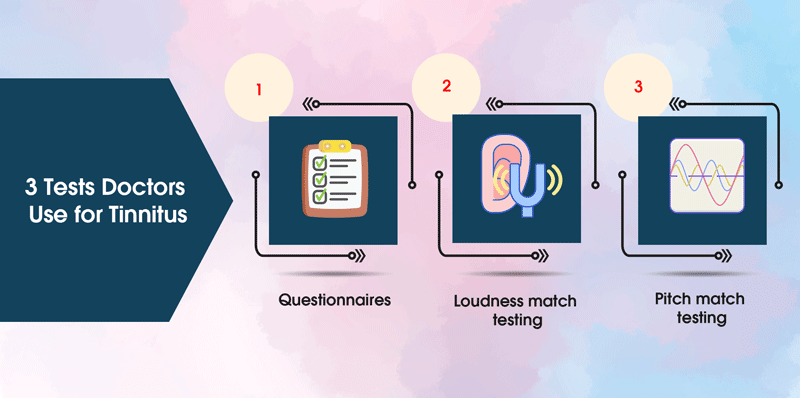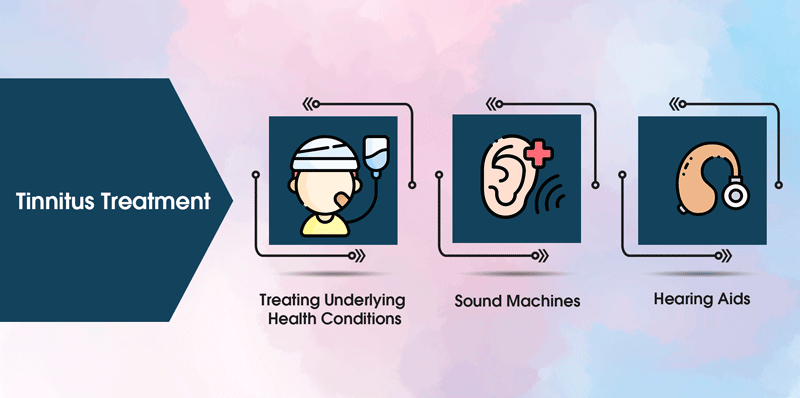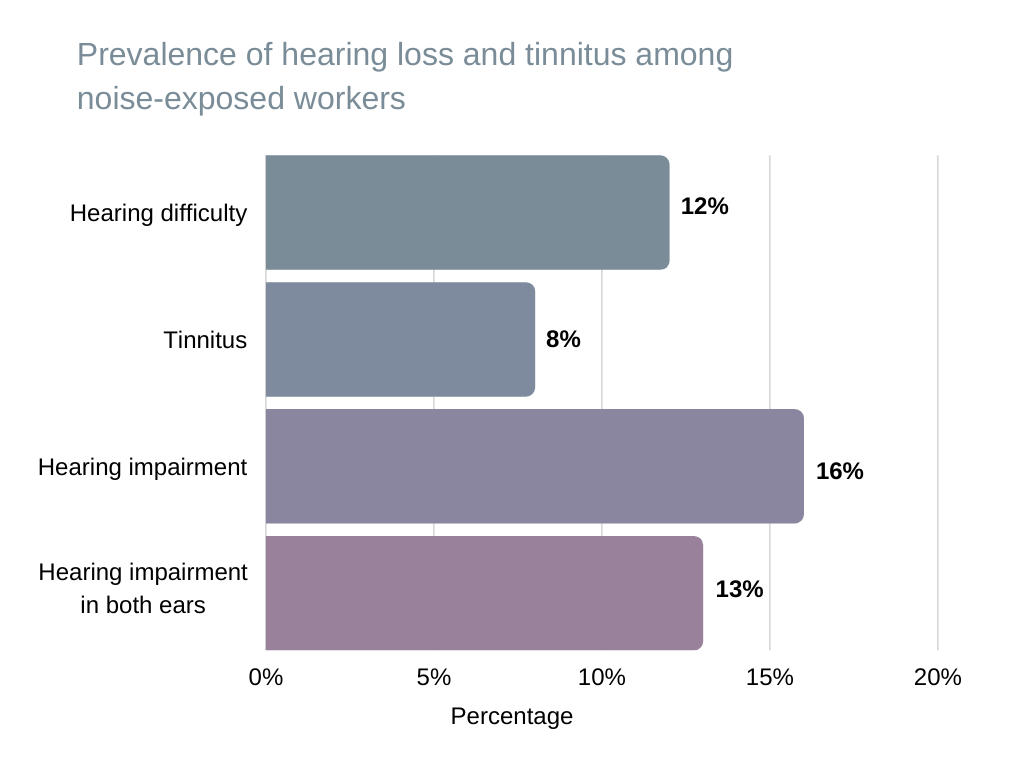The word tinnitus comes from the Latin tinnire word meaning “to ring.” It makes sense, as tinnitus is a condition in which a constant noise, often described as ringing, is heard by the sufferer.
A lot of people experience tinnitus to some degree, perhaps as much as half the population. It’s tough to know what the numbers are because we don’t always know what causes tinnitus. In fact, it’s so mysterious, no one can agree on quite what it is.
Key Takeaways
- Tinnitus can be heard as ringing, roaring, or crashing.
- The cause isn’t always known.
- It can sometimes be caused by an underlying health problem.
- It’s frequently, though not always, linked with hearing loss.
- Tools like hearing aids or sound machines can help.
- New treatment options mean relief is possible.
How Do Doctors Test for Tinnitus?
Doctors usually test for tinnitus using:

- Questionnaires.
- Loudness match testing.
- Pitch match testing.
There isn’t a single, widely accepted official definition for tinnitus. In general, it means that there is the perception of noise in one ear or both ears without a corresponding outside cause. Since there’s no outside cause, there must be an ‘inside’ cause, so to speak.
In many cases, tinnitus is identified as being caused by an underlying health issue, leading some doctors to call it a symptom, rather than a condition in itself.
In many other cases, we don’t really understand how tinnitus works or what causes some cases, so developing a test to detect it is difficult [1]. A few options have been developed, mainly focusing on the patient’s experience and prior history.
Questionnaires
Questionnaires assess how tinnitus may impact the sufferer. When the tinnitus can’t be linked to another health problem, treatment usually focuses on managing the distress tinnitus can cause [2].
By asking a series of questions in a format similar to a mental health inventory, a doctor can assess how tinnitus may impact a patient and what can be done to treat it.
Loudness Match Testing
One important aspect of people’s experience of tinnitus is its volume. Obviously, the louder the ringing, hissing, buzzing, or other sounds, the more likely it is to negatively impact someone’s quality of life.
Essentially, a sound is played at different volumes until the patient identifies it as being about the same volume as the tinnitus [3].
Pitch Match Testing
Pitch matching is very similar to the loudness matching test. Instead of matching loudness, however, an audiologist is trying to match the tone, sort of like the musical note of the sound.
Not all tinnitus sounds have a tone, strictly speaking. Additionally, both these tests depend on the patient’s perceptions, which can vary over time and may be difficult to match.
What Are the First Signs of Tinnitus?
Obviously, the first sign of tinnitus is usually a noise heard by the sufferer that doesn’t have an identifiable cause. The sound may come and go, and the nature of the sound may change as well.
Many people experience this to some degree, but not everyone’s symptoms are bad enough to report. That’s one big reason it’s hard to know exactly how many people tinnitus affects.
As with many other conditions, when symptoms begin impacting the life of a patient, it’s time to seek medical help. Hearing health is assessed by professional audiologists.
Quality of Life
It might be time to visit a doctor if you are experiencing:
- Difficulty sleeping.
- Difficulty concentrating.
- Feelings of depression or anxiety.
- Increased stress associated with tinnitus.
Hearing Loss
While it may seem counterintuitive, tinnitus isn’t always associated with hearing loss [4]. It seems like if you can hear a loud noise, it will drown out other sounds, including music or loud speech.
In most cases, however, tinnitus isn’t associated with an actual noise. As a result, it may not interfere with your ear’s ability to pick up sounds.
Understanding Tinnitus Frequency
While 10% of adults in the United States have reported some degree of tinnitus, the percentage might actually be much higher [5]. However, not all cases of tinnitus are exactly the same, and it’s essential to identify the specific hearing markers as there are various potential treatment options available.
Objective vs. Subjective
In the vast majority of cases, there isn’t an actual sound to go with the tinnitus. In some rare cases, however, an actual sound has been identified.
Essentially, a doctor can listen closely near the patient’s ear and hear the same sound they do. Called objective tinnitus, the noise is usually caused by problems with the veins, arteries, or muscles pulsing around the ear.
Tonal, Pulsatile, and Musical
Cases of tinnitus can also be divided up by the type of noise heard [6].
- Tonal tinnitus is a near-continuous sound, which can change in tone or volume.
- Pulsatile tinnitus includes pulsing noises coinciding with the heartbeat. Objective tinnitus is usually pulsatile.
- Musical tinnitus is the perception of music or singing.
Online Tinnitus Test
As there isn’t usually any physical cause for tinnitus noises, it’s thought that the problem actually lies in the nerves concerned with hearing. While that means treatment options like surgery or medication aren’t likely to help, that does leave tinnitus open to some innovative new forms of treatment.
One such uses our brains’ ability to adapt, more technically called neuroplasticity. The idea behind this sort of treatment is that the nerves that have learned to react to the frequencies associated with tinnitus have become over-stimulated in some way [7].
Using pitch matching, like the online tinnitus test available here, it’s possible to identify those frequencies, then retrain the nerves to be less reactive. Tinnitrack uses a method that eliminates those frequencies from music or other audio, so those nerves go unstimulated.
Tinnitus Treatment
Unfortunately, there’s no cure for tinnitus. Since we don’t really understand what causes it, it’s tough to try to figure out a treatment that can address it directly. Treatments can involve therapy to help manage distress, as well as some tools to drown out the tinnitus.
Treatments should always start with an appointment with a professional audiologist to assess hearing health generally, as well as any hearing loss associated with the tinnitus. The American Tinnitus Association offers a tool to find audiologists near you.

Treating Underlying Health Conditions
Sometimes tinnitus can be the result of other, identifiable underlying causes. When that’s the case, treatment options usually focus on the illness to resolve the tinnitus.
Sound Machines
Sound machines, also called maskers, use another sound to drown out the tinnitus sounds [8]. Masking at least provides a change of pace, which many people find a relief. As tinnitus can be associated with hearing loss, these have been built into hearing aids for the ear, masking some sounds while amplifying others.
Hearing Aids
Hearing loss can sometimes be considered a cause of tinnitus, so addressing that can also help the tinnitus. Hearing aids may also help patients with tinnitus symptoms by elevating background noise and reducing tinnitus noise in the ear, so they can hear loud speech better [9].
FAQ
What Causes Tinnitus?
There can be many causes for tinnitus, including other illnesses like high blood pressure or hearing loss. The cause may not always be clear.

What Does Tinnitus Sound Like?
Tinnitus sound is often described as ringing, crashing, or roaring. The volume and tone a patient will hear can vary in different ways.
How Do You Confirm Tinnitus?
Confirming tinnitus takes an appointment with an audiologist, who will perform several tests before making a diagnosis.
Can You Pass a Hearing Test With Tinnitus?
Your ability to pass a hearing test can depend on a few factors. While hearing loss is often associated with tinnitus, that’s not always the case. In fact, some tinnitus sufferers become more sensitive to sound, a condition called hyperacusis.
What Is the Most Effective Treatment for Tinnitus?
As far as we presently understand, there is no single treatment that will address all cases of tinnitus symptoms [10]. The most effective treatment is going to be one that is tailored to the individual’s symptoms, including strategies like:
- Therapy to manage patient distress.
- Tools like sound machines.
- Identifying and treating the underlying cause.
Conclusion
Tinnitus is very treatable, and it’s sufferers can likely find some degree of relief in treatment. New ideas are now available, so that even hard-to-treat cases can find help. If you have hearing damage, increasing your hearing test frequency can be a good idea. Online hearing tests and tone-deaf tests are also an option to try out.
References:
- McFerran, Don J., et al. “Why Is There No Cure for Tinnitus?” Frontiers, Frontiers, 17 July 2019, www.frontiersin.org/articles/10.3389/fnins.2019.00802/full?&utm_so&fbclid=IwAR17OaX2upBh6YkzfL_C9S9_KRFNDgA9lZrzHsek0TeUzuvsV4Jt-pF6Orw.
- “Department of Otolaryngology.” Tinnitus Questionnaires | Department of Otolaryngology, medicine.uiowa.edu/oto/research/tinnitus-and-hyperacusis/tinnitus-questionnaires.
- Hoare, Derek J., et al. “Agreement and Reliability of Tinnitus Loudness Matching and Pitch Likeness Rating.” PLOS ONE, Public Library of Science, 5 Dec. 2014, journals.plos.org/plosone/article?id=10.1371%2Fjournal.pone.0114553.
- Zeng, Fan-Gang, et al. “Tinnitus Does Not Interfere with Auditory and Speech Perception.” Journal of Neuroscience, Society for Neuroscience, 29 July 2020, www.jneurosci.org/content/40/31/6007.abstract.
- Bhatt, J. M., Lin, H. W., & Bhattacharyya, N. (2016). Prevalence, Severity, Exposures, and Treatment Patterns of Tinnitus in the United States. JAMA otolaryngology– head & neck surgery, 142(10), 959–965. https://doi.org/10.1001/jamaoto.2016.1700
- “Symptoms.” American Tinnitus Association, 26 May 2021, www.ata.org/understanding-facts/symptoms.
- Cima, R. F. F., et al. “A Multidisciplinary European Guideline for Tinnitus: Diagnostics, Assessment, and Treatment.” HNO, Springer Medizin, 7 Mar. 2019, link.springer.com/article/10.1007/s00106-019-0633-7?wt_mc=Internal.Event.1.SEM.ArticleAuthorOnlineFirst&utm_source=ArticleAuthorOnlineFirst&utm_medium=email&utm_content=AA_en_06082018&ArticleAuthorOnlineFirst_20190310.
- Baguley, David, et al. “Tinnitus.” The Lancet, Elsevier, 2 July 2013, www.sciencedirect.com/science/article/pii/S0140673613601427.
- Maldonado Fernández, M., Shin, J., Scherer, R. W., & Murdin, L. (2017). Interventions for tinnitus in adults: an overview of systematic reviews. The Cochrane Database of Systematic Reviews, 2017(1), CD011795. https://doi.org/10.1002/14651858.CD011795.pub2
- National Research Council (US) Committee on Hearing, et al. “Treatments.” Tinnitus: Facts, Theories, and Treatments., U.S. National Library of Medicine, 1 Jan. 1982, www.ncbi.nlm.nih.gov/books/NBK217858/#ddd00072.





Leave a Reply